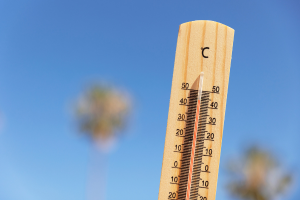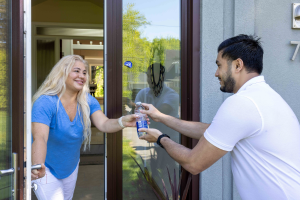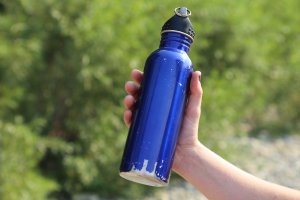Did you know that heat wave safety tips have been added to our first aid app? Download the free app on your Apple or Android phone or tablet now to learn more!
Summer is here, and it's time to enjoy the sunshine and outdoor activities. But summer also means extreme heat waves, which can be difficult to manage for adults and children alike.
That's why it's so important to understand the emergencies associated with extreme heat, to recognize the signs of heat exhaustion and to act appropriately and safely during heat waves.
Understanding heat waves
 An extreme heat event or heat wave is a series of hot days that is much hotter than average for a particular time and place. Extreme heat causes more deaths than any other weather phenomenon.
An extreme heat event or heat wave is a series of hot days that is much hotter than average for a particular time and place. Extreme heat causes more deaths than any other weather phenomenon. Climate change is making extreme heat events more frequent, more severe and last longer, but we can take action to prepare, identify symptoms of heat-related emergencies and seek help during heat waves.
 What are the signs of a heat-related emergency?
What are the signs of a heat-related emergency?
Heat exhaustion: physical signs
When it comes to heat exhaustion, you'll notice that:
- The skin is moist and warm. The individual may experience headaches, excessive sweating, weakness, nausea, vomiting and fainting.
Heat exhaustion: psychological signs
- The individual shows signs of anxiety and dizziness.
- Their breathing remains normal.
Heat stroke: physical signs
Heatstroke presents more severe signs:
- The skin is dry and very hot.
- The individual may experience seizures or possible loss of responsiveness
Heatstroke: psychological signs
- The individual could exhibit unusual behavior or signs of confusion.
- Their breathing is rapid and shallow.
Note: Most illnesses and deaths that happen during a heat wave are NOT caused by heatstroke or related conditions, but by pre-existing respiratory and cardiac diseases.
What should you do in such a situation, and how can you protect yourself?
Whether facing exhaustion or heatstroke, there are a few simple things you can do to cope with a heatwave.

During extreme heat, monitor how you feel and drink plenty of water to keep hydrated, apply sunscreen, avoid direct exposure to sunlight and wear loose-fitting and. light-colored clothing. Avoid caffeine or alcohol, as they can cause dehydration.
Minimize high-energy physical activities and limit the time spent outdoors as much as possible, especially between 11 a.m. and 3 p.m. If you must work outside, plan your tasks outside these hours.
Learn how to prepare for heat waves:

- Listen to local news and weather reports for any updates on heat warnings.
- Arrange air conditioning and fans to help keep your home cool.
- Find places where you can go to cool down, like libraries, malls, and cooling centres in your municipality.
- Discuss heat safety with members of your household.
- Have a plan for wherever you spend time – home, work and school – and prepare for possiblepower outages.
- Drink cool fluids. This is the most important step you can take during a heatwave. On average, a person should drink two to three liters of water a day.
- Avoid being outside if you don’t need to during hottest part of the day.
- Know the humidex rating, which combines the temperature and humidity to indicate how hot, humid weather feels to the average person.
- Wear loose clothing to let air circulate and always wear a hat outside.
- Apply sunscreen (SPF15+) as sunburned skin reduces the body’s ability to cool itself.
- Stop the activities that require energy as it gets hotter and avoid working, exercising, or playing outside for extended periods of time.
- Finally, don’t forget to take a lot of breaks in cool or shady areas to let your body cool off. This will help if you need to be outside when it’s really hot.
How to help someone experiencing heat exhaustion?
If you notice someone showing signs of heat exhaustion, you should:
- Move the person away from the heat and call 911.
- Loosen tight clothing and remove anything that might block air circulation.
- Avoid drying the skin.
- Actively cool the person. Pour water on their torso, and fan the skin.
- If person is alert, give them something cool to drink. This will help rebalance their core temperature.
NOTE: Serious signs and symptoms are in bold. If a person suffers from one of these symptoms, call 911 immediately for prompt attention. Seek immediate medical attention in case of vomiting or confusion, if symptoms worsen or if the core temperature exceeds 40°C (104°F) for more than 45 minutes.

